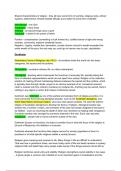Shared characteristics of religion - they all have some form of worship, religious texts, ethical
systems, determinism, female headed officials and a belief of some form of afterlife
Monotheism - one God
Polytheism - many Gods
Animism - all natural things have a spirit
Totemism - a belief in the power of totem
Positive - compensators (something to look forward to), codified sense of right and wrong
(morals), community, explains existential issues
Negative - bigotry, installs fear, damnation, socially divisive (church’s wealth exceeded the
entire wealth of the poor, the only way you could go to heaven was to pay), exploitation
Durkheim
Elementary Forms of Religious Life (1912) - all societies divide the world into two basic
categories, the sacred and the profane:
The profane - mundane ordinary life: our daily routine/grind.
The sacred - anything which transcends the humdrum of everyday life, typically taking the
form of collective representations which are set apart from society. Religion is the collective
practice of marking off and maintaining distance between the sacred and the profane, which
is typically done through rituals, prayer is an obvious example of an ‘occasional (sacred)
ritual’ is marked out from ordinary mundane (or profane) life. Anything can be sacred, there’s
nothing in any object or action that makes it inherently sacred.
Durkheim saw Totemism as one of the earliest and simplest form of religious practice. It is
most commonly found among aboriginal peoples, such as the Australian aborigines, and
North West Native American Indians, who have clan based societies. He used the totemic
religion of Australian aborigines to develop his theory of religion. Aboriginal society was
divided into a number of clans, and members of the clan had certain obligations that had to
be fulfilled – such as mourning the death of other clan members or helping seek vengeance
if another member was wronged by someone external to the clan. Each clan was also
exogenous – people had to marry someone outside of the clan.
Durkheim focuses on functions, he doesn’t consider God or what the focus of the religion is
(church of Madonna). His definition is inclusive.
Durkheim stressed the functions that religion serves for society regardless of how it is
practised or of what specific religious beliefs a society favours.
Religion gives meaning and purpose to life. Many things in life are difficult to understand.
That was true in prehistoric times, and even today much of life and death remains a mystery;
religious faith and belief help many people make sense of the things science cannot tell us.
Religion reinforces social unity and stability. Religion strengthens social stability in two ways
- it gives people a common set of beliefs so is an important agent of socialisation and the
, communal practice of religion brings people together physically, facilitates their
communication and other social interaction, and strengthens their social bonds.
Religion is an agent of social control that strengthens social order. Religion teaches people
moral behaviour and helps them learn how to be good members of society. In the
Judeo-Christian tradition, the Ten Commandments are the most famous set of rules for
moral behaviour.
Religious faith and practice can enhance psychological well-being by being a source of
comfort to people in times of distress and by enhancing their social interaction with others in
places of worship. Many studies find that people of all ages, not just the elderly, are happier
and more satisfied with their lives if they are religious. Religiosity also promotes better
physical health.
Weber's substantive definition:
A clear distinction between the religious and non religious. Share out common sense notions
of what religion is. This is an exclusivist definition of religion, it excludes belief systems like
Buddhism (believe in Nirvana).
Aldridge’s social constructionist definition:
Interpretivist approach. Single universal definitions aren’t possible. Religion means different
things to different people. This definition takes in a range of spiritual practices from what
many see as the traditional to include other symbols of devotion. (Reki and Palmistry).
Transcendental meditation:
Technique where practitioners mentally repeat a word or phrase to achieve a state of inner
peacefulness and bodily calm. It’s roots are in Hinduism. They sit for 15-30 minutes, eyes
closed repeating the same term. Though scientists have been unable to find a link between
transcendental meditation and an effect on disease, those that take part reported feeling
relaxed and had a better understanding of themselves.
Durkheim believes religion is an opportunity to worship as a group. He supports a
value-consensus view of religion. The blurring of the sacred and profane - religious symbols
being used as fashion statements.
Marxism:
False class consciousness - identifying with a class that doesn’t reflect your income. If you
believe in heaven/hell, people will act in a manner to get themselves into heaven.
Alienation - isolation or exclusion caused by exploitation of the proletariat (ie working long
hours limits your social life).
Spiritual gin - the ruling class used religion to create a mystical fog which obscured reality for
the working class.




